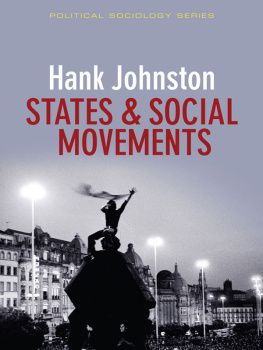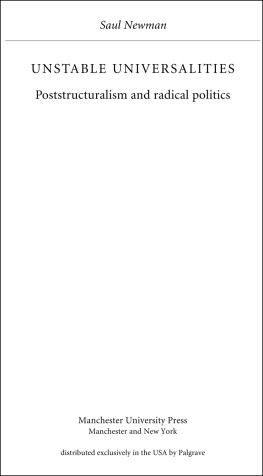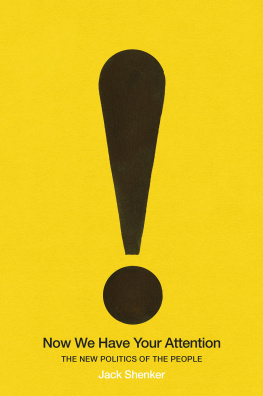
Prefigurative Politics
Building Tomorrow Today
Paul Raekstad
Sofa Saio Gradin
polity
Copyright page
Copyright Paul Raekstad and Sofia Gradin 2020
The right of Paul Raekstad and Sofia Gradin to be identified as Author of this Work has been asserted in accordance with the UK Copyright, Designs and Patents Act 1988.
First published in 2020 by Polity Press
Polity Press
65 Bridge Street
Cambridge CB2 1UR, UK
Polity Press
101 Station Landing
Suite 300
Medford, MA 02155, USA
All rights reserved. Except for the quotation of short passages for the purpose of criticism and review, no part of this publication may be reproduced, stored in a retrieval system or transmitted, in any form or by any means, electronic, mechanical, photocopying, recording or otherwise, without the prior permission of the publisher.
ISBN-13: 978-1-5095-3590-3
ISBN-13: 978-1-5095-3591-0 (pb)
A catalogue record for this book is available from the British Library.
Typeset in 11 on 13pt Bembo
by Fakenham Prepress Solutions, Fakenham, Norfolk NR21 8NL
Printed and bound in the UK by CPI Group (UK) Ltd, Croydon
The publisher has used its best endeavours to ensure that the URLs for external websites referred to in this book are correct and active at the time of going to press. However, the publisher has no responsibility for the websites and can make no guarantee that a site will remain live or that the content is or will remain appropriate.
Every effort has been made to trace all copyright holders, but if any have been overlooked the publisher will be pleased to include any necessary credits in any subsequent reprint or edition.
For further information on Polity, visit our website: politybooks.com
Acknowledgements
Paul would like to thank: my mother and my friends for their love and support throughout this process. Also (all names from here on in alphabetical order) Eivind Dahl, Enzo Rossi, Mathijs van de Sande, and Zoe Addis for reading over the manuscript and offering us their very valuable advice, and the members of the Cambridge Heterodox Philosophy Colloquium and The Aurora Circle for discussions on the ideas that have fed into this book. Part of Pauls work on this book has previously appeared as Revolutionary Practice and Prefigurative Politics: A Clarification and Defence, Constellations 25(3), 2018, pp. 35972. Paul would like to thank the editor of Constellations and two anonymous referees for their insightful feedback and help with improving the article. That article was in turn the result of a bunch of work that Paul started doing as a side project to their PhD, and has benefited from lots of feedback from many different people, in particular Ammar Ali Jan, Dan Swain, Lorna Finlayson Wheeler, Mahvish Ahmad, Raymond Geuss, Tabitha Spence, and Zoe Addis. All deserve thanks for their very helpful discussions on these topics and comments on the drafts and papers that this article and significant parts of this book are based on. Those papers have been presented at the Historical Materialism Conference at the University of York, Toronto in 2014, the Political Studies Annual Conference in both 2015 and 2017, the International Workshop on Emancipatory Theory in 2016, the Association for Social and Political Philosophy Annual Conference in 2016, the Marx 2016 Conference in Stockholm 2016, and the Loughborough University Anarchism Research Groups Speaker-Series in 2018. Paul would like to thank the participants at all these conferences and workshops for their input and feedback in particular Ali Yaln Gymen, David Berry, Ruth Kinna, Thomas Swann, and Uri Gordon.
Saio would like to thank: my sister Emma Gradin for lifelong discussions and for the emotional and intellectual support youve given me while writing this book. Xan Randall for discussing thoughts and ideas, reading drafts of chapters and giving wise advice. Grietje Baars for the many and long discussions, the support, and the invaluable advice on writing and publishing. Katherine McMahon and Jo Chattoo for reading and commenting on drafts of some of my chapters in this book. Thank you also to my PhD supervisors Ray Kiely and Robbie Shilliam who gave me huge amounts of feedback and guidance when I was first developing these ideas as a research student at Queen Mary, University of London. So did Jenna Marshall thank you for our discussions and your insights. The ideas Ive put into this book have also been shaped by the activities and discussions with countless activists and friends, including my best comrades in the International Organisation for a Participatory Society, Harpreet Kaur Paul, David Dominic, and Robert Bennie, and the folks of Queer Mutiny Bristol many years ago. Ive also learned so incredibly much from running workshops and making sense of white supremacy, patriarchy, and capitalism together with Leonie Blacknell-Taylor. Thanks also to Claire from Plan C and Fanny from Research For Action for checking some of my facts on British prefigurative movements.
The authors would also like to thank the four reviewers and George Owers, editor at Polity Books, for their valuable input and suggestions.
Introduction
Ours is an age of crisis and struggle. After the 2008 financial crisis, the banks were bailed out while the people were sold out. Wealth and power are controlled by a tiny minority. The media, telling us things are OK, are in the hands of a tiny oligarchy serving the needs of their corporate advertisers. Real wages are falling while the richest of the world line their pockets. Unemployment and precarity rise along with the misery and desperation they cause. Most people cant even get an education without consigning themselves to a lifetime of debt. Far right movements arent just organising, theyre getting presidents elected to the applause of their corporate backers. Climate change is advancing at breakneck speed, and an estimated 150200 species go extinct every 24 hours. Yet some people wonder why so many are rejecting capitalism
At the same time, were seeing the rebirth and rise of radical movements fighting for a better tomorrow. The best description that many liberal pundits and academics from supporters of Hillary Clintons presidential bid to philosophers and sociologists can come up with when trying to make sense of these movements is resistance. In fact, todays social movements go far beyond mere resistance. Resistance implies taking for granted the basic institutions that have led to our present problems. It offers no real alternative to the status quo. It implies a servile expression of the vain hope that making a fuss will convince the powers-that-be to go back to the way things were to stop the current wave of welfare cuts and deregulation and return to the so-called golden age of welfare capitalism of the 1960s and 70s. But thats what gave us what we have now. The way things were was also deeply unfree, unequal, and undemocratic. The way things were was built on the back of worldwide imperial and colonial tyranny. The way things were also had major inequalities between rich and poor, a majority of the world impoverished and powerless, rampant racism, sexism, homophobia, transphobia, ableism, and more. Thats not something we should hope to get back to.
Our societies dont need resistance; they need reconstruction. This is a book about what that can and should be like.
From a longer-term perspective, things look a lot more hopeful. In the past hundred years alone, radical social movements have won civil rights for people of colour, womens rights, wage increases, and so much more. They have dramatically expanded basic rights and freedoms such as freedoms of speech, press, conviction, and association. They won us the ten- and eight-hour working days, weekends, unemployment benefits, and sick leave. These achievements were the victories of activists and organisers who struggled against elite interests; people with jobs, kids, disabilities, caring duties, facing hate crime, and without many resources, taking on systemic hierarchies and exploitation and winning. Just because that previous wave of movements has been receding doesnt mean that the tide isnt still coming in.
Next page













